CAIRO: Libyan forces loyal to a former military commander have intensified their air strikes on Tripoli, where heavy fighting and blocked roads have left civilians trapped in their homes, officials said on Monday.
Field Marshal Khalifa Hifter’s self-styled Libyan National Army launched an operation to retake the capital on April 4 and has been locked in heavy fighting in and around the city with militias loosely allied with a UN-supported government. The clashes have killed more than 270 people, including 21 civilians, according to the latest UN figures released last week.
Read: UN calls for truce in Libya as fighting intensifies
Libyan officials said LNA air strikes have targeted the Nawasi Brigade in the Abu Salim district, about 7 kilometres from Tripoli’s centre. At least four civilians were killed, they said.
They said air strikes hit Al Qaqaa military camp in the town of al-Falah, south of Tripoli. The camp is controlled by powerful militias from the western town of Misrata that are also allied with the Tripoli government. Air strikes and shelling also hit the towns of Khallet al-Forjan, Ain Zara and al-Twaisha, south of the capital, and heavy fighting was underway in Salah al-Deen, an area that saw earlier clashes between rival militias in September.Residents said fighting has been ongoing overnight in residential areas a few kilometers south of Tripoli. Both sides have used heavy artillery and airstrikes, they said.
“We cannot move because of the shelling from both sides. Our homes have been damaged. We are trying to leave the area to a safer place,” said Mohammed al-Trapoulsi, a 41-year-old father of three from Abu Salim.
On Sunday, LNA spokesman Ahmed al-Mosmari told a news conference in the eastern city of Benghazi that their warplanes targeted the Yarmuk military camp in Ain Zara. The two sides have traded control the strategic camp since the offensive began.
The UN Office for the Coordination of Humanitarian Affairs said the clashes have displaced more than 41,000 people. It said the fighting, along with random shelling, roadblocks and roadside bombs, prevented many civilians from moving to safer areas and hindered efforts to evacuate them or deliver aid.
Hifter, a veteran general who has spent the last few years battling Islamic extremists and rival factions in eastern Libya, says he is determined to restore stability to Libya, which slid into chaos after longtime dictator Moammar Qadhafi was overthrown and killed in 2011. His opponents view him as an aspiring autocrat and fear a return to one-man rule.
Since launching his offensive in Tripoli, Hifter’s forces have captured the districts of Gharyan and Qasr Bani Ghashir, along with several smaller towns. They also seized the capital’s airport, which was heavily damaged and shut down after an earlier bout of fighting between rival militias in 2014.
Hifter is allied with civilian authorities based in the eastern town of Tobruk and has received support from Egypt, the United Arab Emirates, Russia and France. The UN supports the government in Tripoli and has called for an immediate cease-fire and the organisation of national elections.
Elsewhere in Libya, Hifter’s forces repelled an attack on the Sharara oil field in the country’s southwest. Libya’s National Oil Corporation condemned the overnight the attack, saying production “remains unaffected.” It was not clear who was behind the attack.
Hifter’s forces captured the oil field in February and allowed the NOC, which has remained neutral in the conflict, to resume operations there.
The NOC said that its monthly oil revenues increased by 20% to more than $1.5 billion in March after resuming production from Sharara, which produces around 300,000 barrels a day. The field is operated by the NOC in partnership with a consortium that includes Total, Repsol, Statoil, and OMV.
Libya has struggled to rebuild its oil industry its main source of revenue since 2011.
Published in Dawn, April 30th, 2019













































